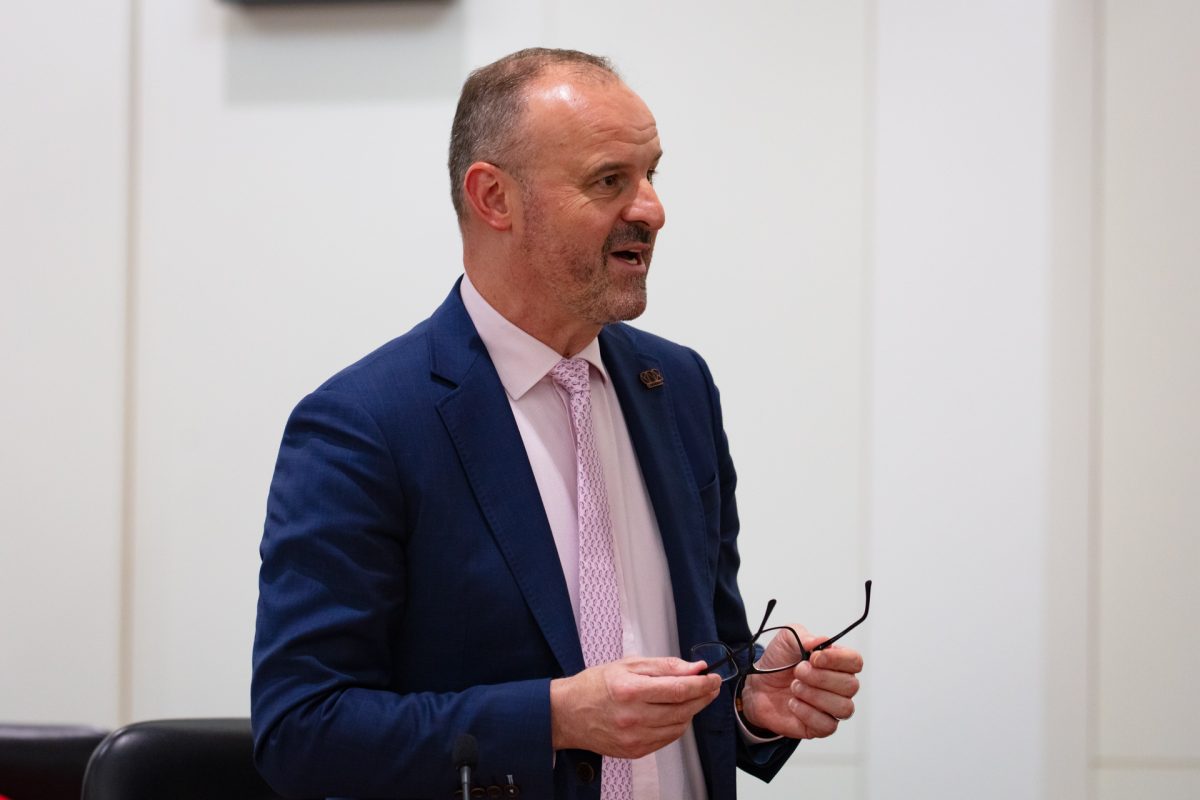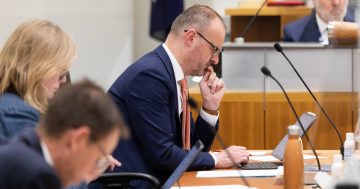
Chief Minister Andrew Barr told the committee inquiry there was no money to investigate implementing a four-day work week in the upcoming ACT budget. Photo: Thomas Lucraft.
A four-day work week is not on the current government’s agenda and much would still have to be done to even trial the concept, the Chief Minister has told a committee inquiry.
He hosed down the idea as ACT Labor members prepare to vote on making the proposal party policy at the 2023 Annual Conference in July.
Chief Minister Andrew Barr was questioned alongside other government representatives during a hearing by the standing committee on economy and gender and economic equality on Thursday (25 May).
He was asked if the government would be open to trialling the concept in the public sector and what such a trial would look like.
Mr Barr explained that while he was “certainly open” to the idea, enterprise bargaining agreements were currently underway with many public sector arms and no money had been allocated to trialling a four-day work week in the upcoming budget.
“This is not an issue on my agenda at the moment … I won’t be doing anything until I see [this] committee’s report,” he said.
He questioned whether the trial would only be applied to the public sector, arguing that it couldn’t just “operate in a bubble” outside the rest of society and the national economy.
“My view is if we’re going to do this, it’s for everyone,” Mr Barr said.
“If we’re fair dinkum about discussions for four days, then it needs to be four days across the [entire] system.
“We can’t have our cake and eat it too.”
Questions were raised over how other areas of the Territory’s services and economy would operate, such as: if teachers were to have a four-day work week, would children still have to go to school five days per week? Would a shift system be created, or would businesses and the government need to employ even more people to keep services and schools open beyond the four days? How would this be possible given challenges around recruitment? Given the variety of public sector roles overseen by the government, would everyone get to work four days and still be paid the same?
This last option has been highlighted as the preference in recent survey results, asking Canberrans how they felt about the matter.
“In some circumstances, that wouldn’t work,” Mr Barr said.
“The degree of flexibility in regard [to pay] would depend on the needs of that business unit.”
Mr Barr said he felt the only viable way for people to work fewer days but still be paid the same amount would be if it were proven productivity would significantly benefit.
The impact on other businesses would also have to be taken into consideration.
“If we took it to the extreme where we had a three-day weekend … then for some businesses that would be a boost … for others it would presumably mean less activity,” Mr Barr said.
“If you’re in, say, tourism, you’d [probably] be very happy for people to have more time. In hospitality, probably the same, unless you relied on people coming into the office.”
ACT Treasury deputy under treasurer Stephen Miners also testified productivity would be an important aspect to consider and whether changing the working week would improve this.
He said this would be “very difficult” to measure and would vary between industries.
“I do worry about the impacts,” Mr Miners said.
“Even with something like working from home … [that] found some areas had an increase in productivity, but others needed [to work] face-to-face [as productivity] fell through the floor.”
How the implementation of a four-day work week would impact ‘burnout’, as well as making the ACT an attractive employer, were also discussed.
ACTPS Future Workforce Strategies Group executive group manager Janet Wilson told the hearing that since the pandemic, building a culture of how people could disconnect from work was an important issue and one which would become “even more critical” if a four-day work week was created.
“This would require a completely different way of thinking about how we work,” she said.
Ms Wilson highlighted that a lot of time and money would have to be committed to creating the roadmap and trials into how the workforce would transition.
“It would take considerable investment just in the planning for something like this,” she said.
“If we’re going down this path, we’d have to start with consultation.”
ACT Labor doesn’t have a formal policy on changing the work week at the moment; however, it’s understood this is a motion that will come up at the party’s yearly branch meeting.
Secretary Ash Van Dijk told the hearing he understood this was an “ambitious policy” which would need to be voted on at the conference before it became an official stance.
“It would be a huge, huge change,” he said.
“We [as a party] do believe there is more to life than work.”




















